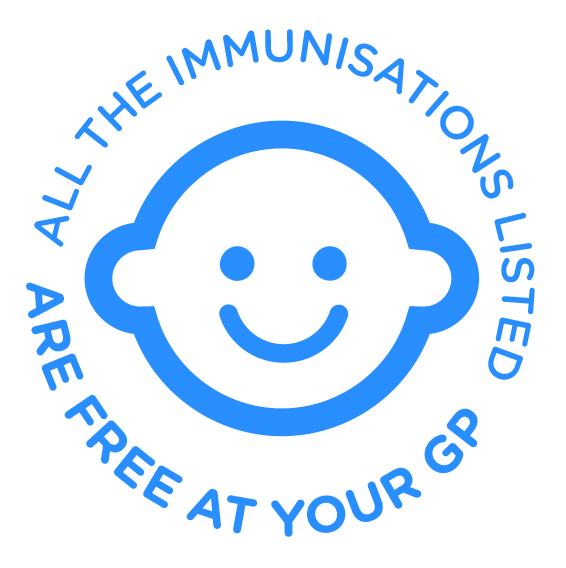Immunisation is a simple, safe and effective way of protecting babies and children against certain diseases. The risks from having these diseases are far greater than the risk of any minor side effects from immunisation.

What causes infection?
Infections are caused by germs entering the body through cuts or by being breathed in or swallowed. The germs then cause diseases such as meningitis (infection of the lining around the brain), pneumonia (a lung infection) or septicaemia (blood poisoning).
Back to top
What is a contagious disease?
A contagious disease is one that spreads from one person (someone who is infected or is a 'carrier') to another through coughs and sneezes.
Carriers are people who 'carry' germs in their body but are not sick themselves. For example, 1 in 10 people carry meningococcal germs but only 1 in 10,000 gets sick with meningitis or septicaemia from those germs.
Back to top
How does my child's body fight infection?
When germs infect your child's body, your child's immune system makes 'antibodies'. Antibodies do the following two things:
- Their first job is to attack and destroy the germs. However, because it takes the body time to make enough antibodies, the germs may damage your child's body before the antibodies can destroy them.
- Their second job is to stay in your child's body to protect them against future infections. If the same germs try to infect your child again, the antibodies will destroy the germs before they have a chance to make your child sick. This way of dealing with germs is called 'immunity'.
It is why most people get diseases like measles or chickenpox only once, even though they might be exposed to them many times.
The problem with getting natural immunity from germs is that your child has to get sick before they develop immunity. In fact, some germs could make your child very sick or even kill them before their body could produce enough antibodies to destroy the germs.
Back to top
How do vaccines work?
When your child is given a vaccine, their body responds by making antibodies, the same as if they had caught the disease but without getting sick. Their body then produces antibodies to destroy the vaccine and these stay in your child's body and protect them against the actual disease.
Back to top
How long do vaccines take to work?
It usually takes a few weeks for vaccines to work, so your child will not be protected immediately. Also, most vaccines need to be given several times to build up long-lasting protection. For example, a child who gets only one or two doses of the whooping cough vaccine is only partly protected against that disease and may still catch whooping cough.
Back to top
Why does my child need more than one dose of a vaccine?
More than one dose of the same vaccine is given in the first few years of a child's life. The extra doses improve the antibody response and give better long term protection.
Booster doses of some vaccines are also given to school children to give better long term protection.
Back to top
What are the names of the vaccines my baby will receive?
The table below shows the vaccine product name and the company that makes the vaccine.
The table below shows the vaccine product name and the company that makes the vaccine.
|
Age
|
Vaccination
|
Product Name
|
Manufacturer
|
|
2 Months
|
6 in 1
+
PCV
+
MenB
+
Rotavirus
|
Infanrix Hexa
Prevenar 13
Bexsero
Rotarix
|
GSK
Pfizer
GSK
GSK
|
|
4 Months
|
6 in 1
+
MenB
+
Rotavirus
|
Infanrix Hexa
Bexsero
Rotarix
|
GSK
GSK
GSK
|
|
6 Months
|
6 in 1
+
PCV
+
MenC
|
Infanrix Hexa
Prevenar 13
Menjugate
|
GSK
Pfizer
GSK
|
|
12 Months
|
MMR
+
MenB
|
MMRVaxpro
Bexsero
|
MSD Ireland (Human Health)
GSK
|
|
13 Months
|
Hib/MenC
+
PCV
|
Menitorix
Prevenar 13
|
GSK
Pfizer
|

Back to top
Where can I find out more information about these vaccines?
All vaccines used by the HSE as part of the immunisation programme are licensed by the Irish Medicines Board and the European Medicines Agency.
The following websites provide detailed licensed information about the vaccines
This information can be found in the patient information leaflet (PIL) and the Summary of Product Characteristics (SPC).
To search these websites you need to know the name of the vaccine. The product names of each vaccine used in the primary childhood immunisation schedule are
|
Vaccine
|
Product Name
|
Manufacturer
|
|
6 in 1
|
Infanrix Hexa
|
GSK
|
|
MenB
|
Bexsero
|
GSK
|
|
Rotavirus
|
Rotarix
|
GSK
|
|
PCV
|
Prevenar 13
|
Pfizer
|
|
MenC
|
Menjugate
|
Novartis GSK
|
|
MMR
|
MMRVaxpro
|
MSD Ireland (Human Health)
|
|
Hib/MenC
|
Menitorix
|
GSK
|
|
Hib
|
Hiberix
|
GSK
|
Back to top
Where can I find a list of vaccine ingredients?
The following websites provide detailed licensed information about vaccines including the ingredients:
To search these websites you need to know the name of the vaccine. The product names of each vaccine used in the primary childhood immunisation schedule are
|
Vaccine
|
Product Name
|
Manufacturer
|
|
6 in 1
|
Infanrix Hexa
|
GSK
|
|
MenB
|
Bexsero
|
GSK
|
|
Rotavirus
|
Rotarix
|
GSK
|
|
PCV
|
Prevenar 13
|
Pfizer
|
|
MenC
|
Menjugate
|
Novartis GSK
|
|
MMR
|
MMRVaxpro
|
MSD Ireland (Human Health)
|
|
Hib/MenC
|
Menitorix
|
GSK
|
|
Hib
|
Hiberix
|
GSK
|
The list of ingredients is available in the Patient Information Leaflet (PIL)
More detailed information can be found in the Summary of Product Characteristics (SPCs). SPCs follow a standard format and to find what is in each vaccine you should look at Section 2 - Qualitative and quantitative composition and Section 6.1 – list of excipients.
Back to top
Where can I get a copy of my child's vaccination records?
The primary childhood immunisation programme is carried out in GP (family doctor) practices. The practice should have a copy of your child's vaccination records for the vaccinations they have carried out. The records may also be available from your local health office.
In most areas the school immunisation programme is carried out by the HSE school immunisation teams and the vaccination record will be held in your local health office. In a small number of areas the school vaccinations are carried out in GP practices and records should be available through your GP or local health office.
The National Immunisation Office produces vaccination passports that you or the vaccinator can fill in so you can keep all vaccination records together. Order a copy of this booklet for your child's vaccinations. (you will be directed to the HSE Health Promotion website)
Back to top
For more information
Back to top
This page was updated on 17 June 2022